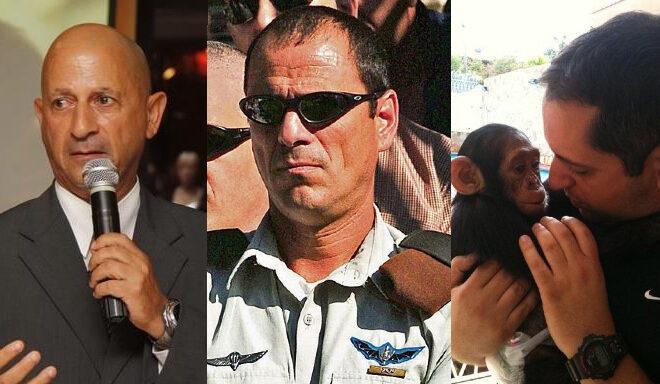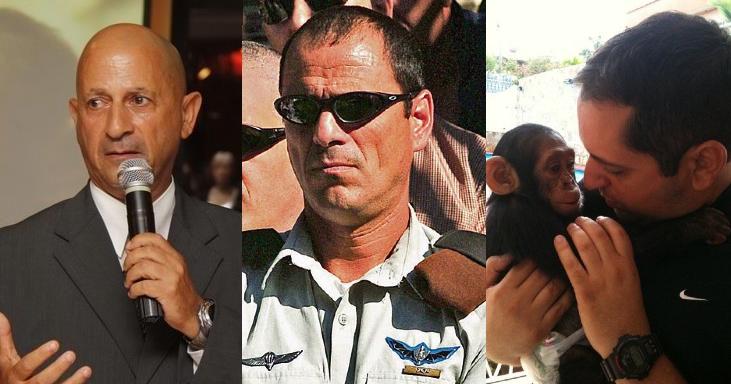Making a killing: Israeli mercenaries in Cameroon

Our investigation found Israeli citizens have been training Cameroon’s most notorious military unit for years, making them huge sums in the process.

Avi Sivan (l), Erez Zuckerman (c), and Eran Moas (r). Credit: Ape Action Africa; Effie Musir; @MoasLucie.
In November 2018, Eran Moas basked under the Caribbean sun by an infinity pool stretching towards the horizon. The Israeli citizen was taking a much-needed break by holidaying in the Bahamas with his wife and children.
The beachside villa he rented did not come cheap at a cool $20,000 a day, but this expense was of little concern to Moas. His personal portfolio of properties includes a New York flat worth over $20 million, which he bought without a loan, and a Los Angeles villa worth over $12 million. His usual place of residence is a massive mansion in Cameroon’s capital of Yaoundé where he reportedly travels around in a bullet-proof car escorted by a team of bodyguards.
Moas enjoys this lifestyle thanks to his long-standing job with the Rapid Intervention Battalion (BIR), an elite unit of the Cameroonian army, as well as business ventures with the Cameroonian government. The BIR operates under the direct orders of President Paul Biya, who has been in power for 37 years. The Cameroonian battalion is known for the arduous training regime its soldiers go through and their access to superior weaponry.
The BIR is also notorious for its ruthlessness. Human rights organisations have documented extensive torture and arbitrary killings by the unit. One of its former soldiers told African Arguments that he personally witnessed two mass executions in the north of Cameroon in which a group of about ten victims were forced to dig their own graves, then told to lie in them before being shot dead.
The BIR’s actions have received particular attention since the Anglophone conflict began in 2016. In this uneven fight between government forces and poorly armed separatists, the unit has faced multiple accusations of burning villages, raping women, conducting extrajudicial killings and torture. These abuses prompted the US to cut some of its long-standing military aid to Cameroon in February 2019 and have been strongly condemned by the UN, European Union and others.
“The BIR is sort of Mr Biya’s private army because they are not answerable to the regular army chain of command,” explains Kah Walla, an opposition politician in Cameroon. “You have a dictatorial president, who has shown himself to be repressive [and] then created a private armed force. And, of course, this has increased the level of repression.”
Moas is not the only Israeli contractor to provide services to the BIR. An investigation by African Arguments, in partnership with Israel’s Channel 12, examined long-standing ties between certain Israeli citizens and President Biya’s elite forces. These links stretch from the 1980s up to today when the likes of Moas profit substantially from the relationship. The investigation found no evidence of direct links between these individuals and human rights violations.
A lavish lifestyle
Working with the BIR is a lucrative venture. The unit is well-funded and widely believed to be financed through an “off-budget” account of Cameroon’s national oil company. As such, its revenue could come indirectly from oil companies drilling in Cameroon. This includes several British firms such as one that struck a natural gas deal in 2018 worth £1.5 billion ($1.9 billion).
Israelis are involved in the training, command and supply of weapons to the BIR, although the corporate structures through which they operate are opaque. New soldiers are recruited for the unit every few years and are trained in batches of one to two thousand. After graduating, soldiers have been given Israeli-made assault rifles. One former BIR recruit, who graduated in 2015, says that about a hundred Israeli trainers spent three months in Cameroon training his cohort. The recruit says they told him they were each paid around $1,000 a day.
The arrangement appears to be all the more profitable for those at the top. Our investigation reveals that Moas has bought at least $32 million dollars-worth of property in New York, Los Angeles, Haifa and Yaoundé, much of it without a mortgage. He also lives a lavish lifestyle. He bought three $5,000 tickets to watch the Mayweather Jr. vs Pacquiao fight in May 2015 and his wife has been seen wearing a $60,000 diamond-encrusted Rolex.
Moas’ known real estate investments began in 2010 with the $1.6 million purchase of a Los Angeles villa with a pool, stunning views of the city and in-house cinema. He sold it for $2.7 million in 2014. In July 2015, he bought a flat in New York on the 49th floor of a glass skyscraper on Billionaires’ Row. It was purchased for $20 million through a shell company. This way of buying the property was likely intended to keep the purchase secret, but Moas’ name shows up on the firm’s tax filings which African Arguments obtained through a freedom of information request.
The following year, Moas bought a $12 million villa in Hidden Hills, an exclusive gated community in Los Angeles, according to Dirt.com (the article has since been removed). This property was also purchased through a shell company, whose address is listed as ”c/o Kohli & Partner”, a law firm based in Switzerland that was revealed in the Paradise Papers to represent various dubious clients.
None of this seems to have made much of a dent in the family’s budget. Later that year, they stayed in a villa at the Four Seasons Bahamas Ocean Club, costing around $20,000 per night. They returned the following year.
More recently, Moas’ ambitions seem to have gone beyond his job with the BIR. In April 2018, a mysterious company called Portsec SA obtained a $43 million contract to build security infrastructure around Cameroon’s port of Douala. The company is registered in Panama, a secrecy jurisdiction, and no owners are listed on its website, but two sources we talked to point to Moas as the person behind the deal. According to a document leaked to Cameroonian activist Boris Bertolt, Portsec obtained the contract via a “special tender” from the president’s office. The document is blurry, but the address for the company can be deciphered as “c/o Kohli & Partner”, the same Swiss lawyers Moas used for his Los Angeles purchase.
We could not trace a direct line between Moas’ Cameroonian interests and his real estate purchases, but he does not appear to have other significant sources of income. Called on his Cameroonian cell phone, he hung up after we introduced ourselves and he did not respond to questions sent to his Whatsapp account. The Port of Douala and the Kohli & Partner law firm didn’t respond to repeated requests for comment.
An historic relationship
Cameroon’s close links with Israel stretch back far before Moas entered the scene. They can be traced to 1984 and a failed coup. President Biya, who had been in power for just two years at the time was nearly toppled by his own army. He reportedly suspected that Cameroon’s former coloniser France had supported the attempted overthrow and thus looked for new partners to ensure his security.
He first turned to Israeli businessman Meir Meyuhas, a former secret agent working for Israel, and later Meir’s son Sami. The father and son had an exclusive license from Israel’s Ministry of Defence to negotiate arms deals with Cameroon. This particular arrangement ended in 2001, but the supply of Israeli arms into the country continued. Several sources told Efrat Lachter of Israel’s Channel 12 that the Meyuhas are still behind military exports to Cameroon.
We were not able to reach the Meyuhas for comment.
According to various BIR soldiers, each new recruit since 2009 has received a brand-new firearm produced by Israel Weapon Industries (IWI), an Israeli arms manufacturer. These have included ACE 21, Galil, and more recently Tavor assault rifles, which cost around $1,900 each. Israeli companies also provide the BIR with armed personnel carriers – such as the Saymar Musketeer and Thunder – and equip the Presidential Guard.
But Israel’s involvement in Cameroon’s armed forces go much deeper than just arms deals. In fact, an Israeli, Abraham Avi Sivan, created the BIR unit in 1999, initially under a different name. Sivan had formerly commanded several elite units in Israel’s army before pivoting to the private sector as Israel’s defence attaché to Cameroon. In his retirement from civil service, he trained and supervised Cameroon’s Presidential Guard and worked to establish the BIR under the command of Cameroon’s defence minister and President Biya himself.
In 2010, Sivan died in a helicopter crash near Yaoundé. Since then, the identities of his replacements have been carefully guarded, though various names – including likely fake ones such as “Maher Heretz” – circulated. One name in particular has been reported by various sources.
A former brigadier general
“General Erez Zuckerman was at the top,” said one former BIR soldier, who recalls hearing from colleagues that this man would replace Sivan around 2012. This account was confirmed by several others. “It’s like when a new president has taken power in [a] country; the name was circulating without even you seeing the person,” he added.
Zuckerman is a former brigadier general in the Israeli army. Unlike Sivan, his career did not end brilliantly. In the 2006 Lebanon War, his division made spectacular mistakes, leading him to resign in disgrace, saying “I have failed”. After quitting the army, his friends told reporters “he’ll probably run his family’s farm; they own a herd of cattle”. Instead, the former Israeli commander turned to the BIR.
The former BIR soldier says Zuckerman visited each of Cameroon’s military bases to introduce himself. He recalls that he first saw the new general in the Bakassi region, near the border with Nigeria. “He came with a helicopter in 2012,” he said. “By then we already knew who he was.”
The last time the soldier saw Zuckerman was in February 2018 at the military’s Salak base in northern Cameroon. “It was like an inspection to see how work is being done,” he said, explaining that Zuckerman gave orders to officers. The BIR has been shown to conduct torture at Salak, and the US has an ongoing investigation into the presence of its own soldiers at the base. Another soldier said that he saw him twice in Yaoundé in May 2019, including once at a military base.
Zuckerman admitted to African Arguments that he had worked as a military adviser in Cameroon but said he hasn’t returned there since 2017. He declined to respond to further questions.
At some point, Zuckerman appears to have handed over the lead to Eran Moas. By contrast to his predecessors, Moas wasn’t a career military man. When he arrived in Cameroon in 1998, he initially worked for the Israeli conglomerate Tadiran to maintain the communications systems of the army. He was later hired by the Cameroonian military directly.
In this role, he likely first worked under the supervision of Avi Sivan. In 2004, an Israeli journalist reported on his visit to an ape sanctuary near Yaoundé that had been established by Sivan and received “enormous support” from Moas. The reporter noted that Moas was driven around in “a jeep of the Cameroon army, chauffeured by a member of the Presidential Guard, who wears Israeli Paratroop wings and has on red Paratrooper boots”. He wrote that Moas was “known as captain or general in these parts”.
A controversial relationship
According to Israeli human rights lawyer Eitay Mack, who campaigns to increase transparency in Israel’s defence exports, the arrangement between the BIR and Israeli’s trainers is highly unusual.
“It’s a very rare situation that Israel is approving someone to conduct a unit,” he says. Mack explains that Moas, Zuckerman and their colleagues would need formal licences from the Israeli government for their work in Cameroon. Mack says it’s unlikely they would circumvent this requirement.
“Nobody is ready to violate [this rule] because it would be considered as a criminal security offence,” he says. “It’s like being a traitor…[Moas] is doing it with a license from the Israeli government for sure. He is not doing it on his own as a private citizen.”
The Israeli Embassy in Yaoundé directed us to the Ministry of Foreign Affairs in Israel. Their spokesperson said they would not comment, adding “we don’t have to give an explanation”. The Ministry of Defence refused to provide specific information but said that export licenses are “subject to constant scrutiny and periodic assessments by the senior echelons of the Ministry of Defense and Ministry of Foreign Affairs”.
Mack believes the Israeli government’s position on the matter may be strategic. “Paul Biya is one of the most reliable friends of Israel in [the whole] African continent,” he says. “The payoff is [for Cameroon] to support Israel openly in international forums…Cameroon is an important part of helping Israel to get legitimacy…It’s all part of the geopolitical fight with the Palestinians.”
In March 2018, Mack filed a petition to the Israeli Supreme Court to cancel all export licenses to the BIR and freeze the awarding of new ones. The court ruled a few months later, but the judge issued a gag order which means Mack cannot share the outcome of the case. But according to one source within the BIR, most of the soldiers who graduated in 2019 were given Croatian rifles, not Israeli.
If Israel has stopped its defence exports to Cameroon, it would make any military training by Israeli citizens illegal too, according to Mack. It may be too little too late, however. “There are so many Israeli weapons over there, and the unit already [has] Israeli knowledge, so the effect [would be] limited,” he says.
For opposition figure Walla too, much damage has already been done. “It’s a very bizarre setup to have an armed force [with] a foreign national as a commander,” she says. “Even if these are private Israeli consultants, or they belong to private firms, most of them are former Israeli military officers…It places Israel in a position where, within the Cameroonian population, they are seen as part of this repressive force.”
Weapons identification by Leone Hadavi. This article was developed with the support of the Money Trail Project.








The BIR’s are primitive, barbaric, savage, inhumane, animalistic, perverts, and even worst cowards. They can’t fight at all.
All that money and see what these Israeli mercenaries end up creating? A psychopathic baby-killing and women raping machine.
Unbelievable.
Happy to read the news
The truth is yet to be revealed.
Really a wonderful piece of information. Only time will tell. We know very soon all these will be brought to book. These are the sweat of Cameroonian minerals being wated by foreign citizens
Use of mercenaries agaist civilians is a violation of international law. BIR is implicated in mass murder, torture and atrocities in Southern Cameroons. The Southern Cameroons Defense Forces (SOCADEF) has reported white advisors accompanying BIR and other Camerounian forces, it was thought at first they were Wagner Group up from the CAR, we now know it was Israelis.
The online casinos present free bonus game position models that allow the gamblers to gain real money bonus. You’ve to understand there are a number of casinos that provide that company on the internet. To understand more about this you can browse the sites and reviews written by the casino’s clients or check with the casino’s on the web casinos that are associated with the slot device business. A great on the web casino must be well known for giving the best casinos and bonus games. It’s also advisable to browse the bonus news that is provided for you by the online casinos so you will undoubtedly be aware with any new upgrade in the benefit game slot machines.
chroloquine https://chloroquineorigin.com/# what is hydroxychloroquine 200 mg used for
Good one
Good work
Amazing writing
I found information about Eran Moas leaked.
His home address is 831 So. Gramacy Place, LOS ANGELES, CA,, phone +1 323-559-1863, SSN 567-68-5116
A lot of nonsense, I know the person..
So easy to write without being responsible for the information..